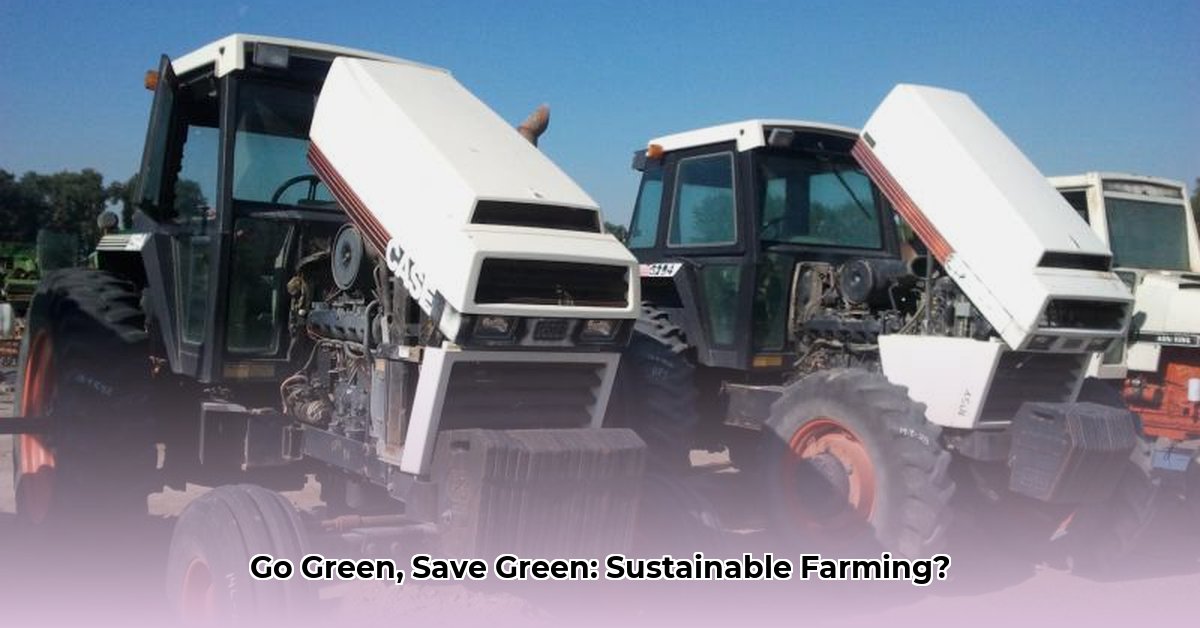
Nyssa Tractor Salvage: A Case Study in Sustainable Agricultural Equipment Sourcing
Nyssa Tractor Salvage, based in Nyssa, Oregon, presents a compelling case study in sustainable agricultural practices. By focusing on the salvage and resale of used farm equipment parts, the company offers farmers a cost-effective and environmentally conscious alternative to purchasing new machinery. For efficient land preparation, see how to remove rocks efficiently. This article analyzes Nyssa Tractor Salvage’s business model, highlighting its successes, challenges, and opportunities for growth within the broader context of sustainable agriculture.
Business Model Overview
Nyssa Tractor Salvage operates on a straightforward yet impactful business model. The company acquires used and broken-down farm tractors and implements. These machines are then meticulously dismantled by experienced mechanics. Usable parts are cleaned, repaired, and cataloged for resale, while unusable materials are responsibly disposed of. The company leverages online auctions through Pickett Auction Service to reach a nationwide customer base, reducing transportation costs and emissions associated with traditional auctions. This efficient system dramatically reduces waste and provides farmers with affordable, high-quality replacement parts. With over 10,000 loyal customers, their operational efficiency is clearly demonstrated.
Sustainability Aspects: Reducing Waste, Increasing Efficiency
Nyssa Tractor Salvage's commitment to sustainability is inherent to its operations. The core principle is the responsible reuse and repurposing of parts, extending their lifespan and significantly reducing the environmental impact associated with new equipment manufacturing. However, opportunities for improvement exist in bolstering transparency and quantifying their impact. More details on the origin and processing of salvaged parts would significantly enhance their sustainability profile. Quantifying the amount of waste diverted from landfills or calculating reduced carbon emissions due to parts reuse would provide concrete data supporting their environmental claims, attracting environmentally conscious customers and potentially securing various certifications. Isn't a clear quantification of environmental benefits a crucial step toward broader acceptance and market leadership?
Challenges and Opportunities: Growth and Risk Mitigation
Nyssa Tractor Salvage faces challenges common to many businesses, including efficient inventory management of a vast and diverse range of parts and navigating a competitive landscape where the appeal of new equipment remains strong. However, these challenges also present significant opportunities for growth. Strategic partnerships with farm equipment manufacturers could provide a consistent supply of reclaimed parts, mitigating supply chain vulnerabilities. Expanding into new geographic markets and diversifying service offerings (e.g., repair services, maintenance contracts) could further drive revenue and solidify their market position. Doesn't strategic expansion into new markets represent a significant opportunity for growth and increased market share?
Stakeholder Perspectives: A Collaborative Approach
Nyssa Tractor Salvage's model benefits various stakeholders. Farmers benefit from cost savings and access to sustainable alternatives. Equipment manufacturers could collaborate on parts reuse programs, creating a more circular economy and reducing their environmental footprint. Policymakers can incentivize such sustainable practices through grants or tax breaks. This collaborative approach demonstrates the potential for responsible business practices to drive positive environmental and economic outcomes.
Conclusion: The Future of Sustainable Equipment Sourcing
Nyssa Tractor Salvage offers a compelling model for sustainable equipment sourcing in agriculture. Their success highlights the potential of circular economy principles within the agricultural sector. While their current model is efficient and effective, enhancing transparency, implementing robust risk management strategies, and fostering strategic partnerships will be crucial for maintaining their position as a leader in sustainable agriculture. The company's approach inspires other businesses to adopt similarly responsible practices, contributing to a more environmentally and economically sustainable future for farming.
Actionable Steps and Risk Mitigation
To further enhance its success, Nyssa Tractor Salvage should implement several key strategies detailed below:
Enhance Transparency: Develop a comprehensive system for tracking and verifying the origin and quality of all parts, making this information readily available to customers. This will significantly bolster trust and further solidify their commitment to sustainable practices.
Optimize Inventory Management: Invest in advanced inventory management software to improve efficiency, reduce waste, and ensure parts availability. This would also allow for more effective demand forecasting.
Forge Strategic Partnerships: Actively pursue collaborations with equipment manufacturers to secure a consistent supply of reclaimed parts and explore joint sustainability initiatives. This collaboration could ensure a steady stream of supply and strengthen their position in the market.
Expand Market Reach: Utilize targeted marketing strategies to expand into new geographic areas, broadening customer base. This would increase their customer base and overall market penetration.
These actions will contribute to long-term sustainability and growth. A robust risk assessment matrix helps visualize and mitigate potential threats, as seen below:
| Risk Factor | Likelihood | Impact | Mitigation Strategy |
|---|---|---|---|
| Parts Shortage | Medium | Medium | Diversify sourcing; build stronger relationships with suppliers. |
| Demand Fluctuations | Medium | Medium | Improve demand forecasting; implement a flexible inventory system. |
| Increased Competition | High | High | Develop a unique brand identity; emphasize cost-effectiveness and environmental sustainability marketing. |
| Lack of Transparency | High | Medium | Enhance parts traceability and sourcing transparency; pursue relevant certifications. |
By proactively addressing these issues, Nyssa Tractor Salvage can secure ongoing success.